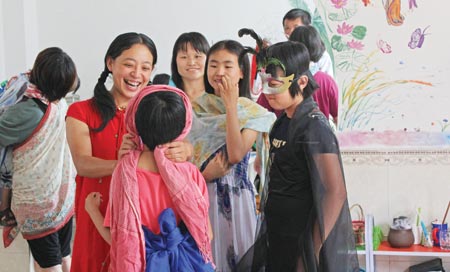An unconventional education
Updated: 2012-07-05 10:03
By Zhang Yue (China Daily)
|
|||||||||||
 |
|
Song Xiayan (second left) helps a girl dress up for a party in her home schooling community of Dali, Yunnan province. Photos Provided to China Daily |
Planting vegetables, cooking, fishing and dancing are part of the curriculum at a home-schooling system in a small community in Dali, Yunnan province. Zhang Yue reports.
Song Xiayan's self-introduction on a social networking site connected her with parents who share similar educational values. "I come from Guangdong province where people eat basically everything. Now, I eat only vegetables that I grow myself," Song writes on Douban, a social networking site popular among Chinese youths.
The 38-year-old started a popular online home schooling community.
Better known as "Super Vegetarian Mom" on the Internet, Song's main educational philosophy is letting children get close to nature and learning about what interests them most.
"Giving my daughter a happy childhood is what I think about most," says Song, who moved to Dali, Yunnan province, in 2010.
More than 20 families from various cities in China who are convinced of Song's "natural" education system, have migrated to Dali.
About half the families now live, work and study together on a 0.27-hectare plot of land, which also has a vegetarian restaurant; while the others live in other parts of Dali and commute to the community school daily.
Children in the community start their day working in the fields, followed by one or two hours of reading a book they like, and cooking lunch together. The kids also receive lessons, such as music, dancing and handicrafts. They go out fishing and hiking almost every week.
Song is not their only teacher. The children are also taught by their parents, university student-volunteers and local folk artists.
There is no fixed curriculum or homework.
"We are people who have escaped from the burden of a normal, traditional education system," Song says. "I want to give my daughter a happier, more cherished childhood. I don't care for degrees."
Before arriving in Yunnan, Song worked as a senior executive at a foreign enterprise, and her husband worked in a bank.
"We led a hectic life similar to most white-collar workers," Song says. "We didn't have time to smell the flowers."
What bothered Song most was that her daughter, Xixi, was experiencing an unhappy childhood because her worth was measured by her school achievements.
Related Stories
Adopted children discover China 2012-07-04 14:06
Demi Moore children worried about her 2012-06-13 14:24
The vegetarian persuasion 2012-06-04 13:01
Special screening of children's films 2012-05-30 14:09
S Korean children experience monks' life 2012-05-16 10:13
Today's Top News
Rescuers race against time for quake victims
Telecom workers restore links
Coal mine blast kills 18 in Jilin
Intl scholarship puts China on the map
More bird flu patients discharged
Gold loses sheen, but still a safe bet
US 'turns blind eye to human rights'
Telecom workers restore links
Hot Topics
Lunar probe , China growth forecasts, Emission rules get tougher, China seen through 'colored lens', International board,
Editor's Picks

|

|

|

|

|

|





